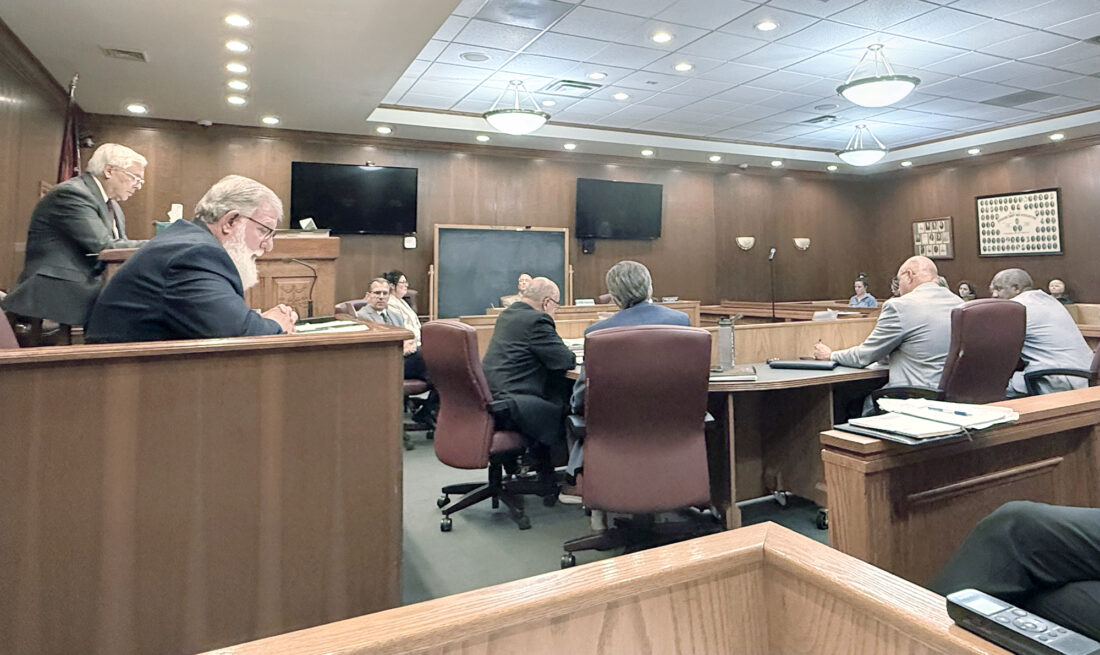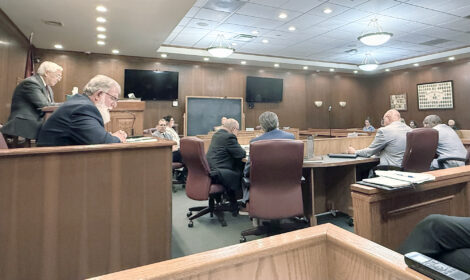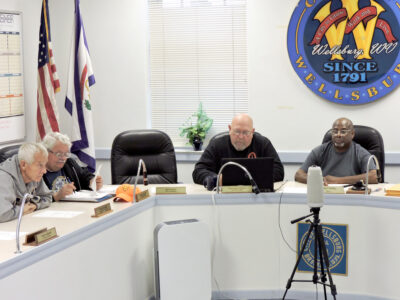Council debates conditional use permit

DISCUSSION — Steubenville City Council members say public sentiment is just one of the reasons they’re recommending the Planning and Zoning Commission deny a conditional use permit requested by a company that bought two buildings downtown in hopes of opening a 26-bed residential treatment center. -- Linda Harris
STEUBENVILLE — While it’s not binding, City Council made it clear Tuesday they don’t think Brookfield Counseling and Recovery should get the conditional use permit it needs to operate a 26-bed, for-profit mental health and behavioral facility in downtown Steubenville.
Brookfield planned to open a 26-28 bed residential treatment center at its newly acquired properties — the former Catherine’s Care Center, 717 N. 6th Ave. and a standalone home next to it — but will need a conditional use permit to operate the treatment center because it’s too close to Beacon House: Because Brookfield and Beacon House offer similar services, the city’s zoning ordinance requires at least a 1,250-foot buffer between them.
In an unprecedented move, council voted 6-0, with one abstention, to recommend the Planning and Zoning Board deny the permit request. While it’s not binding, Law Director Costa Mastros said there was nothing wrong with them letting board members know where they stand.
“It is a little out of the ordinary,” he said when asked his opinion. “I wouldn’t want anything to mess up the process that’s set in place right now — it’s going to go in front of Planning and Zoning. If the result doesn’t fit their needs, the applicants, then they can file an administrative appeal to the Court of Common Pleas, so there’s a process already in (place). I don’t think it’s necessarily illegal — it’s a little out of the ordinary, but that’s fine. It’s a recommendation, there’s no force of law.”
Abstaining from the vote was Councilman Royal Mayo, who represents that area. He initially said, “I’m not going to vote, I abstain.” When pressed for a reason, he said, “I don’t want to.”
After the meeting, Councilman at large Joel Walker said he’s not sure if Brookfield’s owners knew they’d need a conditional use permit to operate the treatment center when they purchased the properties, “but I believe the community brought it to our attention.” He said city officials received more than 30 letters in opposition to the residential center from area businesses, churches and residents, and a petition now circulating the community already has 64 signatures on it.
Walker said the facility’s opponents had checked into another Brookfield residential center, this one about 90 miles away, and found out that over a 13-month period police had had to respond to more than 147 calls there. He said residents also are concerned “that it would turn into the ‘Epi Centers’ we had in the city years ago, where the clients would be out wandering the streets.”
He said they also worry that it’s too close to the school.
“We’ve had businesses like this in this city (before) and it’s a concern,” he said, adding critics also pulled the records “for when Epi Centers were open here — in the time they were open there were between 565 and 660 calls to those residences in regard to different types of complaints and everything else. This would also put more of a strain on our police, fire and EMS responding to those calls.”
In their letters of protest, critics pointed out the 1,250 separation between similar facilities was designed “to protect the character, safety and livability of our neighborhoods.”
“Granting this permit would not only violate that regulation but also set a precedent that could make future enforcement more difficult,” Councilman Ted Gorman, one of the letter writers, said, pointing out Brookfield would “significantly increase traffic and congestion on narrow residential streets, reduce available parking and create safety hazards for pedestrians, especially children and the elderly. Experience in other communities has shown that similar facilities often lead to frequent emergency calls, increasing the demand on police fire and ambulance services.” He also said introducing a high-capacity institutional facility will alter the neighborhood’s stability and potentially lower nearby property values.”
“While I strongly support access to mental health care, the location of such facilities must be appropriate. A project of this type belongs in a properly zoned commercial or medical area, not within a dense residential district,” he added. “Placing it here would be inconsistent with the city’s comprehensive plan and the community’s expectations for responsible, balanced growth.”
Church leaders from several area churches said they support the need for compassionate care and recovery opportunities for those struggling with addiction, but voiced concern that it was too close to “our church, our youth ministries and the surrounding schools.”
“Our concern stems not from a lack of empathy, but from a deep sense of responsibility for the safety, well-being and spiritual environment of the children and families who worship, learn and gather at Holy Trinity and in the nearby community,” Holy Trinity Greek Orthodox Church Parish Council President Anthony Mougianis wrote.
Steve Davis of Steve’s Fish and Chips said he was a student at Steubenville High School when the Epi Center group homes were in the north end.
“It was not a good situation for the residents or for us as students. The past group homes were operated for profit, and the same concerns remain today,” he wrote, pointing out they and other businesses “invested in this community and are encouraged by the recent growth and revitalization happening in the area. Allowing a facility of this type would be a setback for that progress.”
Others, like Enzo’s Fine Foods owner Tim Piergallini, pointed out customers, particularly senior citizens, “enjoy visiting downtown to shop and dine, and I worry that this type of facility will make them feel unsafe.” He also pointed to the strain it would put on police, fire and EMS services and said, “Our community should carefully consider who will bear the cost of those additional city services … that (it) may require. Therese are real burdens for a small city like ours.”
Resident Aaron Newman also pointed out that the north end “already houses a disproportionate number of treatment and social service facilities, creating a clear issue of overconcentration.”
“This proposed addition would not only exacerbate that problem but would also violate existing zoning ordinances that were enacted specifically to prevent such overconcentration and to maintain balanced community development. These ordinances exist to ensure that no single neighborhood is unfairly burdened and that facilities of this nature are distributed equitably across the city,” Newman wrote.


